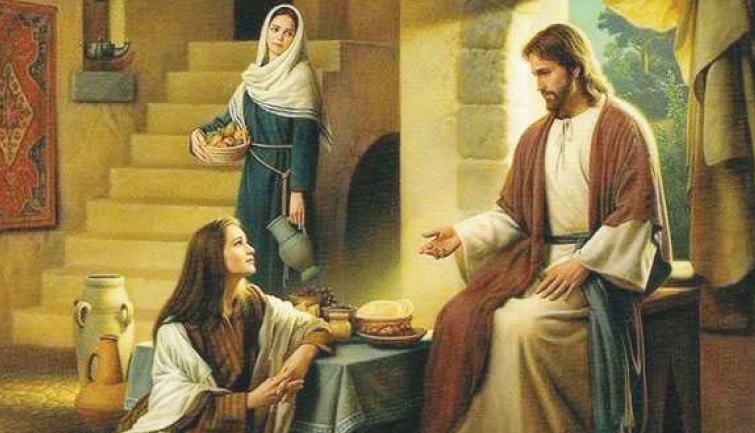Distracted by many things
Mary and Martha represent two ideal types of individuals. Martha appears to be pragmatic and active. When Jesus came to town, she did what the woman of the house usually did in those days: Prepared a meal for the guests and made certain everybody was comfortable.
Jul 15, 2022

Reflecting on our Sunday Readings with Fr Joseph Lubula
16th Sunday of Ordinary Time (C)
Readings: Genesis 18:1-10;
Colossians 1:24-28;
Gospel: Luke 10:38-42
Mary and Martha represent two ideal types of individuals. Martha appears to be pragmatic and active. When Jesus came to town, she did what the woman of the house usually did in those days: Prepared a meal for the guests and made certain everybody was comfortable. The men sat around discussing theology and the great questions of life, or listening to the esteemed rabbi. A woman’s place was in the kitchen, and Martha embraced that role and excelled therein.
However, her pursuit of excellence got the better of her; she became distracted, anxious, and troubled, even though she was in the presence of the Prince of Peace.
Mary, on the other hand, chose a different response to Jesus’ visit. She sat at His feet, as a disciple, listening to every word He said. Somehow, we always find Mary at Jesus’ feet [when Jesus arrived to raise Lazarus from the dead (John 11:32); anointing His feet with expensive ointment (John 12:3; contrary to a common misunderstanding, this was not Mary Magdalene)]. This is the place of submission, where a student seeks knowledge from a teacher, and where a worshipper kneels before God Himself.
Martha had chosen the role of a servant. She followed the normal conventions of society and fulfilled the customary expectations. Mary defied the norms of her day (assuming a position that was normally reserved for men), because in her heart, she was a worshipper. Martha showed her devotion to Jesus by meeting material needs; Mary showed her devotion by showering Jesus with attention, even affection.
Martha noticed that her sister Mary was just seated on the floor at Jesus’ feet, listening to what Jesus had to say. This annoyed Martha — that Mary wasn’t helping her in the kitchen. We can imagine her seething and banging pots and pans a little too enthusiastically to get her sister’s attention and express her annoyance.
And here is where I think we get to the real heart of this passage. Martha never asked Mary to help her. Instead, she asked Jesus to intercede for her, saying, “Lord, do you not care that my sister has left me to do all the work by myself? Tell her then to help me.”
In the therapeutic world, this kind of behaviour is called “triangulation.” So, Mary tried to triangulate Jesus and her sister Mary. Another thing to notice about Martha’s complaint to Jesus is that she referred to herself several times: “My sister has left me to do all the work by myself? Tell her then to help me.” Quite a lot of “me” “me” “me” “my.”
Martha’s generous hospitality had become more about her than about her guest. So, Jesus got to the heart of the problem and answered her: “Martha, Martha, you are worried and distracted by many things.” As one commentator wrote: “Jesus is not going after Busy Martha, but Worried and Distracted Martha.” (James A. Wallace, Feasting on the Word, Year C, Volume 3, p. 265)
At a different time, Jesus might well have commended Martha’s hospitality. But Jesus didn’t have a one-size-fits-all template, and dealt with each person differently. In last Sunday’s Gospel (Luke 10:25-37), Jesus told the lawyer to “go and do” while today he tells Martha to “sit and listen.”
So, it wasn’t Martha’s busyness that Jesus called to account, but her distractedness, her worry, and her lack of focus.
We all have focus and attention issues. Because all of us live in a distracted age where the amount of information available to us is far more than we can take in and absorb.
When we are distracted by information and events outside ourselves, it prevents us from fully developing an interior life, which is one of the factors in faith development and spiritual maturity. When we become distracted responders only to what is outside us, our souls wither from undernourishment and disconnection from God.
We can’t worship when we are distracted. If, like Martha, we are preoccupied with our worries, we remove ourselves from the here and now and live either in the past of regret, or in the future of anxiety, when the only time we really have is the now, and the only place we really have is right here.
Finally, the real activity to which God calls us, the important work of loving as Jesus loved, can only be sustained by the renewing power of the Holy Spirit that we tap into when we worship and pray and draw ourselves into the presence of God. There is a kind of frenetic activism that can lead us to burnout and bitterness. And the Church too often is guilty of valuing busyness over focus.
The word translated here as “better” as in “Mary has chosen the better part” can also simply mean “good.” It’s not that Martha had chosen wrongly and Mary rightly, but Jesus was with them in the here and now and what was called for was attention to Him and focus on Him. Which means that we don’t have to choose between activism and contemplation. We have to choose a balance that makes us whole, free from distraction and worries, focused in faith on what is important.
(Fr Dr Joseph Lubula is a Ugandan Priest from the Catholic Diocese of Lugazi. He is currently at the Pontifical Gregorian University in Rome.)







Total Comments:0